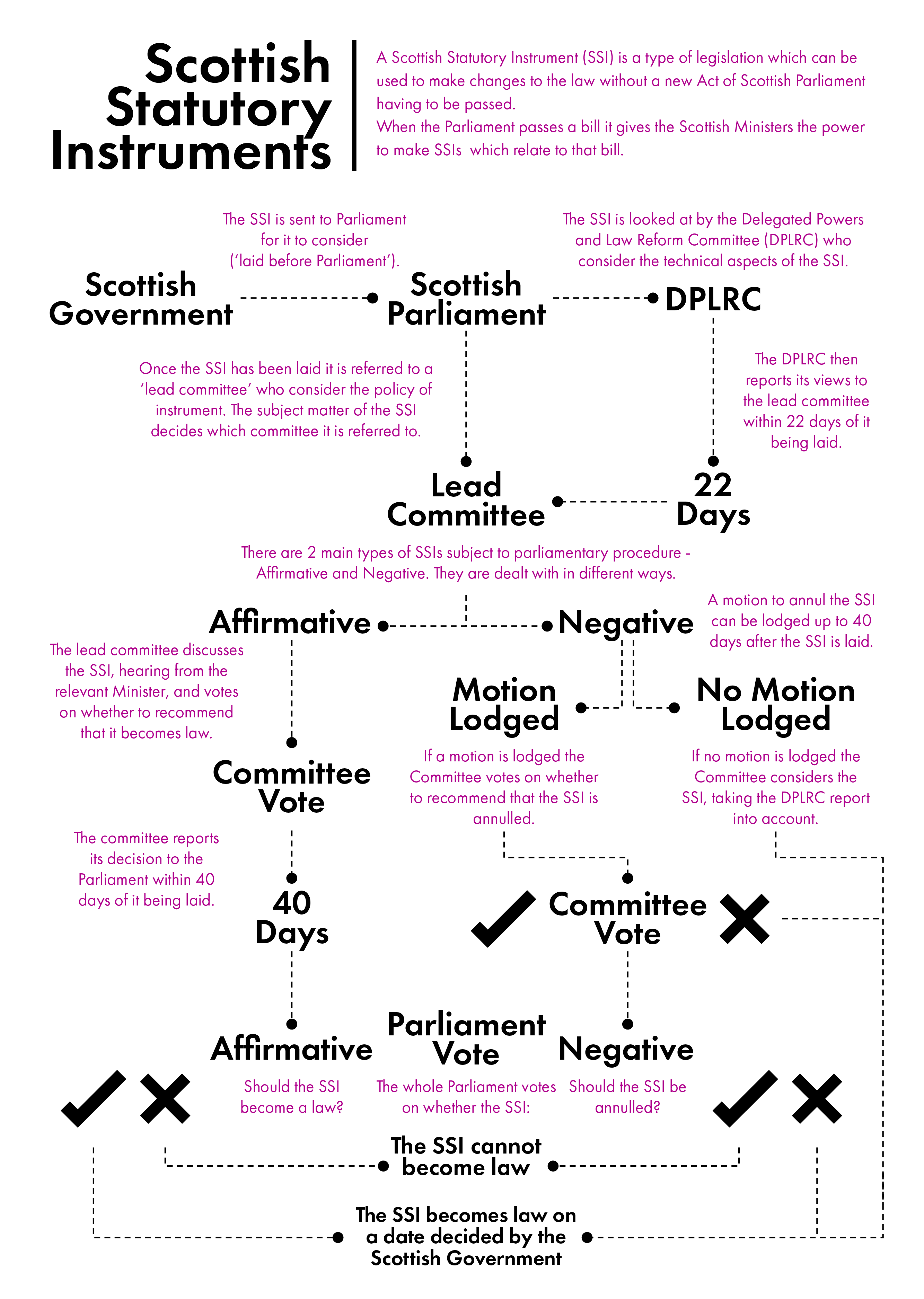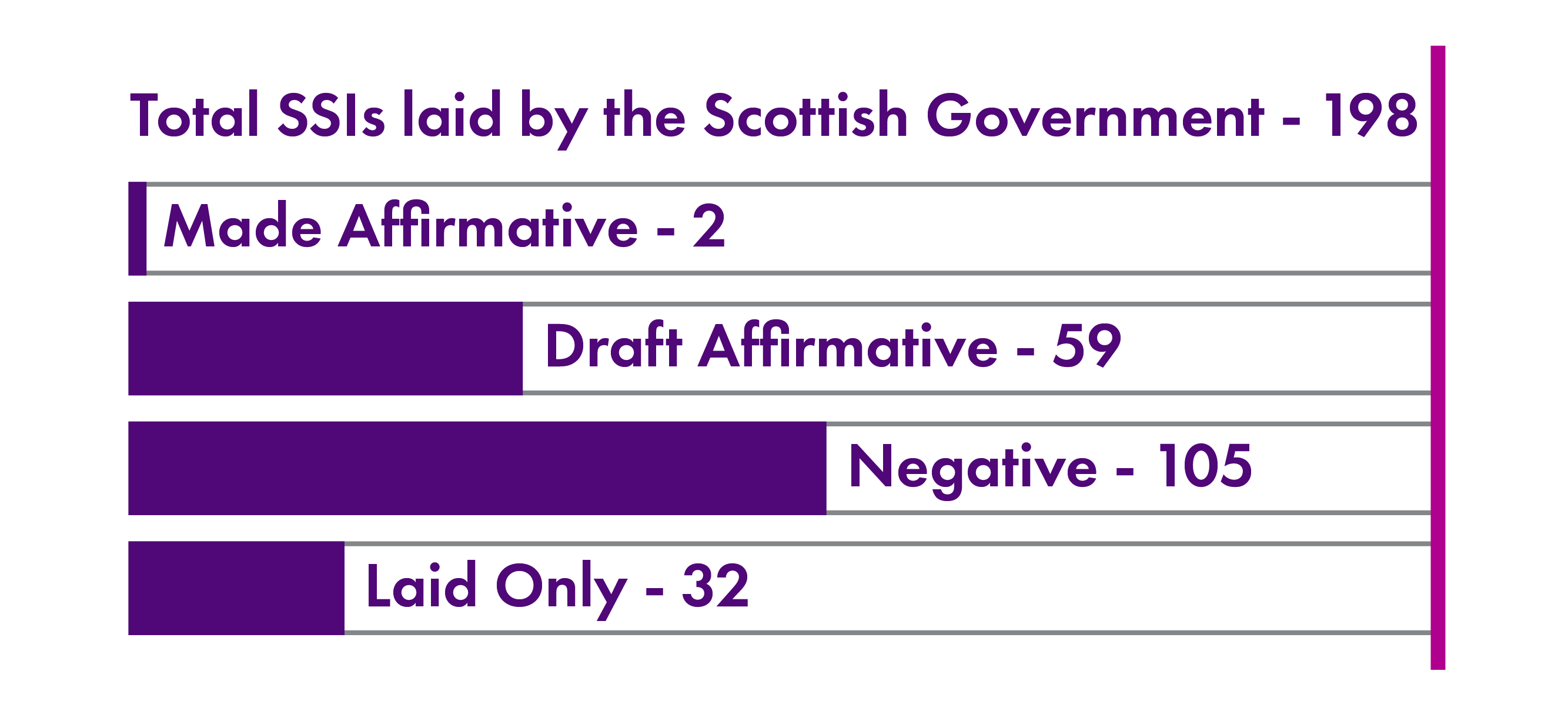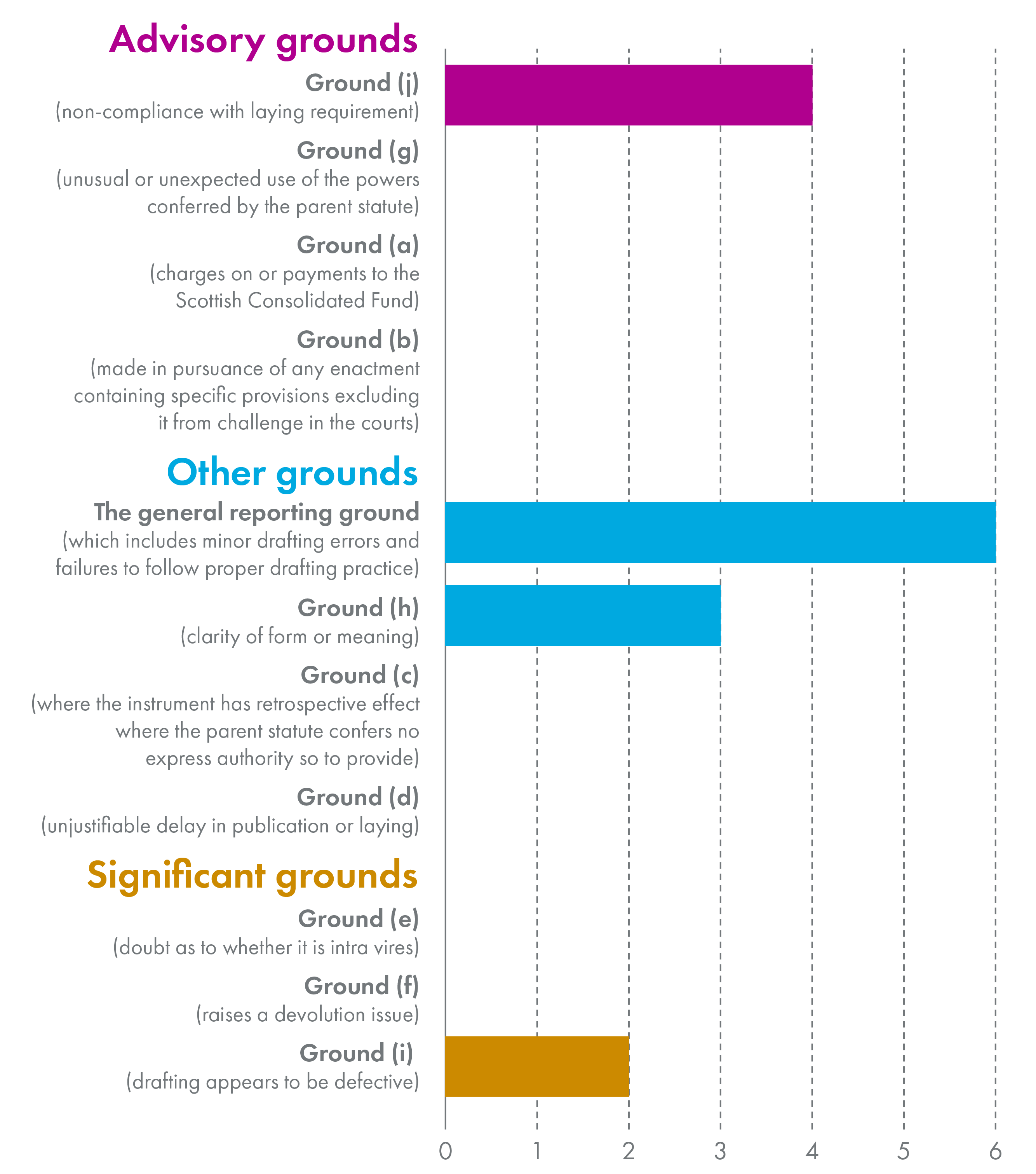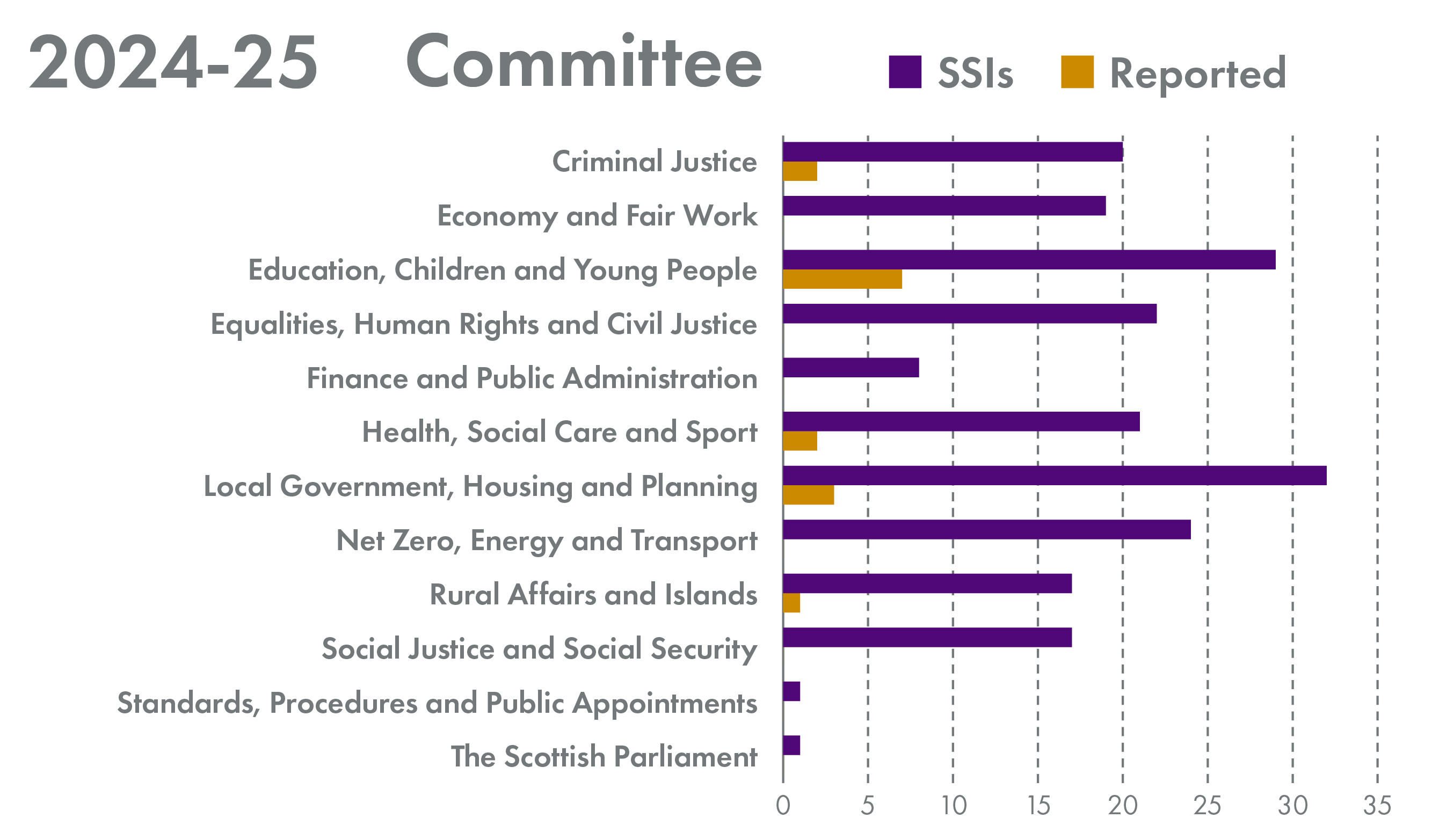Delegated Powers and Law Reform Committee
Work of the Delegated Powers and Law Reform Committee 2024-25
Introduction
This report reflects upon the work of the Delegated Powers and Law Reform (DPLR) Committee in 2024-25. The reporting period covers the Parliamentary Year from 13 May 2024 to 12 May 2025. This report is separate from the annual report required under Standing Orders, and instead focuses on pulling together the Committee’s quarterly reports and looking at trends in its scrutiny over the year.
The DPLR Committee’s remit encompasses a number of different roles which are considered in this report. However, its primary focus is on the scrutiny of delegated powers in Scottish Parliament bills, UK Parliament bills (which delegate powers to make subordinate legislation within devolved competence) and subordinate legislation itself. Subordinate legislation in the Scottish Parliament comes primarily in the form of Scottish Statutory Instruments (SSIs).
In performing its role in scrutinising subordinate legislation, the Committee seeks to:
ensure that legislation is clear, accessible, and operable; and
hold the responsible authority (primarily the Scottish Government) to account.
This report and the quarterly reports the Committee produces over the course of the reporting year are integral to meeting these objectives. Specifically, this report:
reviews the quality of the instruments laid by the Scottish Government and in doing so holds the Government to account whilst seeking to drive continuous improvement in the quality of SSIs laid; and
considers the Committee's scrutiny of delegated powers in primary legislation.
This report, and the quarterly reports the Committee produces over the course of the reporting year, support it in meeting these objectives. Specifically, this report reviews the quality of the instruments laid by the Scottish Government and in doing so, holds the Government to account whilst seeking to drive continuous improvement in the quality of subordinate legislation laid.
This report is therefore part of a broader process of holding the Scottish Government to account.
It should be noted that the report also considers the quality of the instruments laid by the Lord President's Private Office (LPPO). More on the role of the LPPO can be found below.
The report also considers the Committee's scrutiny of delegated powers in primary legislation, and other work undertaken by the Committee.
Membership Changes
There were 5 membership changes in the reporting year:
Oliver Mundell MSP left the Committee on 29 May 2024 and was replaced by Jeremy Balfour MSP.
Foysol Choudhury MSP left the Committee on 2 September 2024 and was replaced by Daniel Johnson MSP.
Tim Eagle MSP left the Committee on 10 October 2024 and was replaced by Roz McCall MSP.
Daniel Johnson MSP left the Committee on 15 January 2025 and was replaced by Katy Clark MSP.
Substitute Membership Changes
Alexander Stewart MSP was replaced by Oliver Mundell MSP on 10 October 2024.
Subordinate legislation and the role of the Committee
Before looking at the instruments which were laid in 2024-25, it is useful to explain what subordinate legislation is. Subordinate legislation is also known as secondary legislation, and in the Scottish Parliament comes primarily in the form of Scottish Statutory Instruments (SSIs).
SSIs are a form of law made by the Scottish Ministers (or other responsible authority such as the Court of Session or High Court for court rules) exercising powers granted by the Scottish Parliament or the UK Parliament.
SSIs are usually in the form of regulations, but can be in other forms such as orders, rules or schemes. They generally set out technical details or administrative matters necessary for primary legislation to operate but can cover any subject matter ranging from criminal penalties, licensing schemes, prescribing application forms, to providing procedural rules.
The content of SSIs is, however, limited by the terms of the primary legislation which authorises their use – referred to as the "enabling power" or "parent Act". In relation to bills introduced in the Scottish Parliament, the DPLR Committee considers these enabling powers in bills as they pass through the Parliament to ensure that:
the delegation of the power is appropriate or whether it is so significant that the substantive provisions should instead be on the face of the bill;
if it is to be delegated, whether the proposed parliamentary procedure for subordinate legislation offers the appropriate level of scrutiny by the Parliament; and
the power has been clearly drafted and goes no further than necessary.
Once a Bill is passed, the Committee will then consider the resultant SSIs made under these powers.
The role of the Committee is to consider these instruments from a technical perspective:
it scrutinises SSIs on behalf of the Parliament to ensure that proposed laws are within the powers the Parliament has delegated to Ministers in the parent Act – a law which is not within the enabling powers is invalid and has no legal effect;
it checks the quality of each SSI to ensure that it is accurate, achieves the intended policy and the drafting is clear to the end user; and
through exchange of correspondence and its reports, encourages and monitors corrective action by the Scottish Government and other rule making authorities.
The policy issues raised by SSIs are considered separately by the Scottish Parliament's various subject committees such as the Criminal Justice Committee, the Net Zero, Energy and Transport Committee and the Rural Affairs and Islands Committee. These are known as the "lead committees".
The Committee also considers proposed delegated powers which are in bills introduced in the UK Parliament, where they would be exercisable within the legislative competence of the Scottish Parliament. Where these powers are conferred on Scottish Ministers, once the bill is passed the Committee will consider the resultant SSIs made under the powers. Where the powers are conferred on UK Ministers, the resultant instruments will be UK Statutory Instruments (UK SIs), rather than SSIs. Most UK SIs are laid only in the UK Parliament and are therefore not scrutinised by the Committee.
SSI Procedures
There are a number of different procedures that can be used when scrutinising an SSI. The procedure used in relation to each instrument is determined by what is said in the instrument's "Parent Act" - this is the legislation that authorises the use of subordinate legislation on a given matter.
The three most common procedures are:
Affirmative – this procedure is attached to instruments relating to significant matters and provides for a greater level of scrutiny than the other two main procedures. Before an instrument which is subject to the affirmative procedure can be made and brought into force, it must be approved by the Parliament.
Negative – this is the most common procedure attached to instruments laid before the Parliament. It is generally attached to instruments relating to matters of less significance than those subject to affirmative procedure. While the Parliament does not need to approve negative instruments before they can come into force, the Parliament can annul a negative instrument.
Laid, no procedure – these are instruments subject to the lowest level of scrutiny in the Parliament. They are laid before the Parliament for technical scrutiny and neither require approval nor can they be annulled.
How does the Committee report instruments?
Before examining the quality of the instruments laid by the Scottish Government this year, it is useful to reflect on how the Committee reports instruments. In considering each instrument the Committee is guided by a set of reporting grounds.
Rule 10.3 of Standing Orders outlines these reporting grounds. In order to make these more understandable and reflective of the extent of the Committee's concerns, the Committee has developed a hierarchy of reporting grounds.
“Significant grounds” represent those areas which would cause the Committee most concern; “Other grounds” consist of areas where that concern would not be so significant, but nonetheless the matters can affect the understanding of an instrument if not its validity; “Advisory grounds” meanwhile relate to matters which the Committee wishes to draw to the attention of the Parliament or lead committee but do not affect the understanding of an instrument. The individual reporting grounds are broken down by their hierarchy below.
Significant grounds:
ground (e) – (doubt as to whether it is intra vires);
ground (f) – (raises a devolution issue); and
ground (i) – (drafting appears to be defective).
Other grounds:
ground (c) – (where the instrument has retrospective effect where the parent statute confers no express authority so to provide);
ground (d) – (unjustifiable delay in publication or laying);
ground (h) – (clarity of form or meaning); and
the general reporting ground (which includes minor drafting errors and failures to follow proper drafting practice).
Advisory grounds:
ground (a) – (charges on or payments to the Scottish Consolidated Fund);
ground (b) – (made in pursuance of any enactment containing specific provisions excluding it from challenge in the courts);
ground (g) – (unusual or unexpected use of the powers conferred by the parent statute); and
Ground (j) - (non-compliance with laying requirement)
The intention of this approach is to enable the Scottish Government, lead committees, stakeholders, and the public more generally to understand the extent of the Committee's concerns and respond accordingly.
Process of the consideration of an SSI
After the Delegated Powers and Law Reform Committee has considered an instrument from a technical perspective, the subject committee within whose remit the instrument falls then has an opportunity to consider the instrument from a policy perspective.
The following infographic explains the process by which an instrument is taken through the Parliament.

How many instruments were considered this year?
The Committee considered 209 statutory instruments during this reporting period and 2 documents subject to parliamentary control. This compares with 203 instruments and 4 documents considered in 2023-24.
198 of the statutory instruments were laid by the Scottish Government and 11 by the Lord President’s Private Office (LPPO).
In relation to the 198 instruments laid by the Scottish Government, these can be broken down by procedure as follows:
2 Made affirmatives.
59 Draft affirmatives
105 Negatives
32 Laid, no procedure
Number of SSIs laid under each procedure

Scottish Government instruments
How many instruments were reported on this year?
A total of 16 instruments were drawn to the attention of Parliament this year. While this overall figure equates to 8% of instruments considered, 5 of the instruments were reported under reporting ground (j) for breaching the 28-day rule, of which the Committee was content with 3 of the Scottish Government's explanations for the breaches. If these 3 instruments are excluded from the total figure, the Committee reported 13 instruments, equating to 6% of the instruments considered.
In the previous reporting year, excluding where the Committee was content with the Scottish Government’s explanations for breaching the 28-day rule, 12 instruments were reported equating to 6% of the instruments considered.
Summary of use of reporting grounds
As discussed earlier in the report, instruments are reported by the Committee under one of 11 grounds as set out in rule 10.3 of Standing Orders.
The infographic below shows a breakdown of reported instruments by reporting groundi. A list of the instruments reported under each ground can be found in Annex A.

The most common reporting ground over this reporting year was the general reporting ground. The number of instruments reported under this ground has decreased from 2023-24 (from 15 to 6).
This reporting year, two instruments have been reported under the most serious reporting grounds. In the previous year there were five.
The Committee notes that there have been fewer instruments in 2024-25 with issues – in particular serious issues – than in the previous year. This is welcomed; however, it continues to encourage the Scottish Government to improve the quality of instruments being laid, particularly those reported under serious reporting grounds.
Which lead committee received the most instruments
The infographic below shows the total number of instruments and documents subject to Parliamentary control laid by the Scottish Government and the LPPO (and those reported, broken down by lead committeei).

The Local Government and Housing Committee received the most instruments this year, with a total of 32.
This year, 1 instrument was considered by the Parliament (3 in 2023-24). Some instruments are referred directly to the Parliament, rather than a lead committee, for example, to meet an expedited timetable.
Instruments from the Lord President's Private Office
Instruments can be laid by the LPPO on behalf of the Court of Session and High Court of Justiciary. These instruments are used to update court rules in Scotland and can be split into two distinct types:
Acts of Sederunt are used primarily to regulate civil procedure in the Court of Session, Sheriff Court and Sheriff Appeal Court; while
Acts of Adjournal are concerned with regulating procedure in the criminal courts.
Both acts of sederunt and acts of adjournal are subject to the same level of scrutiny by the Committee as any other SSI. They are laid by the LPPO as the Lord President is the head of the judiciary in Scotland.
These instruments are laid separately from those laid by the Scottish Government so a separate analysis of the quality of these instruments is provided below.
11 instruments were laid by the LPPO in this reporting year which compares with 10 in 2023-24.
There was 1 instrument reported during this reporting year, under the general reporting ground. Previously, none were reported in 2023-24.
The Committee encourages the LPPO to keep the number of reported instruments as low as possible.
Other SSI related issues
Withdrawal of instruments
If concerns are raised by the Committee (or by others) in relation to draft affirmative SSIs, the Scottish Government can withdraw instruments during their passage through the Parliament. It may then choose to re-lay the instrument correcting any errors pointed out to it. While instruments can be withdrawn and re-laid for any reason, this is one indication of the quality of instruments laid before the Parliament..
During this reporting year the following 8 instruments were withdrawn and re-laid:
Civic Government (Scotland) Act 1982 (Licensing of Short-term Lets) Amendment Order 2024 (SSI 2024/Draft);
Funeral Expense Assistance (Scotland) Amendment Regulations 2024 (SSI 2024/Draft);
Greenhouse Gas Emissions Trading Scheme (Amendment) (No. 2) Order 2024 (SI 2024/Draft);
Rural Support (Improvement) (Miscellaneous Amendment) (Scotland) Regulations 2025 (SSI 2025/Draft);
Disclosure (Scotland) Act 2020 (Incidental, Supplementary and Consequential Provision) Regulations 2025 (SSI 2025/Draft);
Tied Pubs (Miscellaneous Amendment) (Scotland) Regulations 2025 (SSI 2025/Draft);
Social Security (Up-rating) (Miscellaneous Amendments) (Scotland) Regulations 2025 (SSI 2025/Draft); and
Environmental Authorisations (Scotland) Amendment Regulations 2025 (SSI 2025/Draft).
This is an increase to the previous reporting year, where 5 instruments were withdrawn and re-laid.
The Committee encourages the Scottish Government to lay instruments of such a standard that they do not require to be withdrawn in order to correct drafting errors.
Minor points raised
Minor points are generally minor typographical errors in instruments. These are separate to, and much less significant than, points that lead to an instrument being reported. While they do not affect the validity or operation of the instrument in any way, they are nevertheless drafting matters which, taken together, can indicate wider concerns with the overall quality of instruments.
During its scrutiny of instruments in 2024-25, the Committee identified a total of 52 instruments in which minor points were raised; 50 were laid by the Scottish Government and two by the LPPO.
This is similar to the previous reporting year, in which minor points were raised in 50 instruments; 49 were laid by the Scottish Government and one by the LPPO.
Primary Legislation
A primary function of the Committee is to consider the delegated powers provisions in bills introduced in the Scottish Parliament. Over the reporting period, the Committee has considered and reported on the following 14 bills at Stage 1:
Housing (Scotland) Bill
Climate Change (Emissions Reduction Targets) (Scotland) Bill
Assisted Dying for Terminally Ill Adults (Scotland) Bill
Education (Scotland) Bill
Schools (Residential Outdoor Education) (Scotland) Bill
Right to Addiction Recovery (Scotland) Bill
Budget (Scotland) (No.4) Bill
Criminal Justice Modernisation and Abusive Domestic Behaviour Reviews (Scotland) Bill
Land Reform (Scotland) Bill
Leases (Automatic Continuation etc.) (Scotland) Bill
Dog Theft (Scotland) Bill
Scottish Parliament (Recall and Removal of Members) Bill
Tertiary Education and Training (Funding and Governance) (Scotland) Bill - considered on 18 March and 29 April, reported in next Parliamentary year (13 May 2025)
Natural Environment (Scotland) Bill - considered on 29 April 2025, reported in next Parliamentary year (3 June 2025)
The Committee also considered and reported on 13 Bills after Stage 2:
Housing (Cladding Remediation) (Scotland) Bill
Abortion Services (Safe Access Zones) (Scotland) Bill
Agriculture and Rural Communities (Scotland) Bill
Circular Economy (Scotland) Bill
Aggregates Tax and Devolved Taxes Administration (Scotland) Bill
Social Security (Amendment) (Scotland) Bill
Police (Ethics, Conduct and Scrutiny) (Scotland) Bill
Judicial Factors (Scotland) Bill
Welfare of Dogs (Scotland) Bill
Scottish Elections (Representation and Reform) Bill
Scottish Languages Bill
Regulation of Legal Services (Scotland) Bill
Care Reform (Scotland) Bill - considered on 22 April and 20 May 2025, reported in next Parliamentary year (29 May 2025)
The Committee considered 18 bills at Stage 1 and seven after Stage 2 in the previous reporting year.
Legislative Consent Memorandums
Legislative Consent Memorandums (LCMs) are lodged by the Scottish Government in relation to UK Parliament bills which seek to change the law or alter Scottish Ministers’ or the Scottish Parliament’s powers in relation to devolved matters.
The Committee considered powers to make subordinate legislation within devolved competence in the following seven LCMsi:
Renters’ Rights Bill
Tobacco and Vapes Bill
Product Regulation and Metrology Bill
Data (Use and Access) Bill
Employment Rights Bill
Border Security, Asylum and Immigration Bill
Planning and Infrastructure Bill
The Committee also considered powers to make subordinate legislation within devolved competence in the following two supplementary LCMs:
Product Regulation and Metrology Bill
Tobacco and Vapes Bill
In the previous reporting year, the Committee considered 16 LCMs and 8 supplementary LCMs.
Scottish Law Commission Bills
The DPLR Committee can be designated the lead committee in relation to Scottish Law Commission (SLC) bills. SLC bills originate from SLC reports and meet the criteria determined by the Presiding Officer. The criteria for an SLC bill are that it is a bill within the legislative competence of the Scottish Parliament:
where there is a wide degree of consensus amongst key stakeholders about the need for reform and the approach recommended.
which does not relate directly to criminal law reform.
which does not have significant financial implications.
which does not have significant European Convention on Human Rights (ECHR) implications; and
where the Scottish Government is not planning wider work in that particular subject area.
In this reporting year, the Committee has acted as lead committee for the Judicial Factors (Scotland) Bill, and the Leases (Automatic Continuation etc.) (Scotland) Bill.
Framework Legislation and Henry VIII Powers
The Committee held an inquiry on Framework Legislation and Henry VIII powers to explore the perception that framework Bills were increasing and the scrutiny challenges that such Bills presented
Framework legislation sets out principles for a policy but does not provide substantial detail on the face of the Bill as to how that policy will be given practical effect. Instead, this type of legislation seeks to give broad powers to Ministers or others to fill in this detail at a later stage.
As part of its scrutiny, the Committee received a wide range of written responses to its call for views from many stakeholders, and heard evidence over three sessions from academics, the Office of the Parliamentary Counsel, legal bodies, legislators and former officials. For its final evidence session, the Committee heard from the Minister for Parliamentary Business, Jamie Hepburn MSP.
On 6 December 2024, the Committee members met with members of the House of Lords' Delegated Powers and Regulatory Reform Committee, Lord Lisvane (former Clerk to the House of Commons) and the Office of the Parliamentary Counsel to hear about their experience of framework legislation and Henry VIII powers.
On 22 January 2025, Committee members met (online) with the Hon. Natasha Maclaren-Jones, Chair of the New South Wales Legislative Council Regulation Committee, to hear about the New South Wales' experience of framework legislation and Henry VIII powers.
The Committee's report was published on 24 March 2025. The Chamber debate was held on 24 April 2025.
Annex A - Reporting Grounds: 13 May 2024-12 May 2025
Instruments engaging each reporting ground (laid by the Scottish Government unless otherwise noted)
(h) meaning could be clearer
Protection of Vulnerable Groups (Referrals by Chief Constable) (Prescribed Information) (Scotland) Regulations 2024 (SSI 2024/313)
Tied Pubs (Fees and Financial Penalties) (Scotland) Regulations 2024 (2024/Draft SSI)
Carer’s Assistance (Carer Support Payment) (Scotland) Amendment Regulations 2024 (2024/Draft SSI)
(i) drafting appears to be defective
Disclosure (Scotland) Act 2020 (Commencement No. 5, Saving and Transitional Provision) Amendment Regulations 2025 (SSI 2025/73 C.7)
Valuation (Proposals Procedure) (Scotland) Amendment Regulations 2024 (SSI 2024/186)
(j) failure to comply with laying requirements
Recognition of Overseas Qualifications (Charges) (Scotland) Regulations 2025 (SSI 2025/67)
Registration of Births, Deaths and Marriages (Scotland) Act 1965 (Prohibition on Disposal of a Body without Authorisation) Amendment Regulations 2024 (SSI 2024/281) (Committee content with the reason for the 28-day breach)
Sheriff (Removal from Office) Order 2024 (SSI 2024/148)
Town and Country Planning (Fees for Applications) (Scotland) Amendment (Amendment) Regulations 2024 (SSI 2024/369) (Committee content with the reason for the 28-day breach)
Environmental Protection (Disposal of Polychlorinated Biphenyls and other Dangerous Substances) (Scotland) Amendment (No. 2) Regulations 2025 (SSI 2025/78) (Committee content with the reason for the 28-day breach)
General
Act of Adjournal (Criminal Procedure Rules 1996 Amendment) (United Nations Convention on the Rights of the Child (Incorporation) (Scotland) Act 2024) 2024 (SSI 2024/174) (LPPO)
Burial (Applications and Register) (Scotland) Regulations 2024 (SSI 2024/334)
Level 1 and Level 2 Disclosure Information (Scotland) Regulations 2024 (SSI 2024/315)
Property Factors (Registration) (Scotland) Regulations 2024 (SSI 2024/274)
Protection of Vulnerable Groups (Information for Listing and Vetting) (Scotland) Regulations 2024 (SSI 2024/314)
Scottish Pubs Code Regulations 2024 (2024/Draft SSI)
Annex B - Historic Commitments: 13 May 2024 to 12 May 2025
Commitments outstanding at the end of this reporting year:
Scotland Act 1998 (Specification of Functions and Transfer of Property etc.) Order 2019 (SI 2019/183) [11th Report, 2019. Published 06/03/2019] commitment to bring forward an amendment at the earliest opportunity.i
Police Pensions (Remediable Service) (Scotland) Regulations 2023 (SSI 2023/239) [53rd Report, 2023. Published on 21 September 2023] commitments to correct the error in the preamble by correction slip, and to address the other points raised by way of an amending instrument.
Teachers’ Pensions (Remediable Service) (Scotland) Regulations 2023 (SSI 2023/ 241) [53rd Report, 2023. Published on 21 September 2023] commitment to correct these matters in the next amending instrument.
Firefighters’ Pensions (Remediable Service) (Scotland) Regulations 2023 (SSI 2023/ 242) [53rd Report, 2023. Published on 21 September 2023] commitment to correct the error in the preamble by correction slip, and to address these other matters by way of an amending instrument.
National Health Service Pension Schemes (Remediable Service) (Scotland) Regulations 2023 (SSI 2023/246) [53rd Report, 2023. Published on 21 September 2023] commitment to address these matters in the next amending instrument.
Valuation (Proposals Procedure) (Scotland) Amendment Regulations 2024 (SSI 2024/ 186) (49th Report 2024, Published 4 September 2024) commitment to address error by bringing forward amending regulations at the next suitable opportunity.
Burial (Applications and Register) (Scotland) Regulations 2024 (SSI 2024/334) (73rd Report 2025, Published 4 December 2024) commitment to amend the instrument to improve the drafting of the provision at the next available opportunity.
Commitments made by the LPPO
Act of Adjournal (Criminal Procedure Rules 1996 Amendment) (United Nations Convention on the Rights of the Child (Incorporation) (Scotland) Act 2024) 2024 (SSI 2024/174) (47th Report 2024, Published 26 June 2024) The LPPO has advised that the definition will be removed at the next available opportunity.